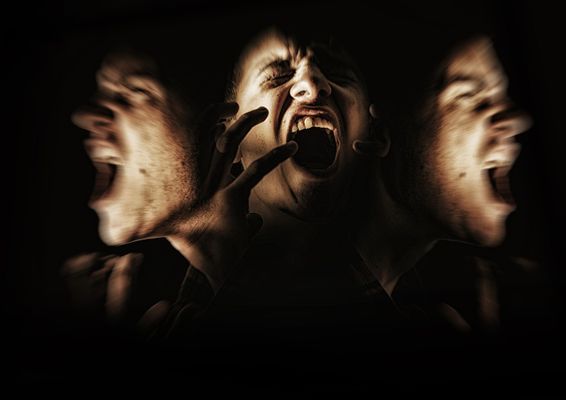3.1.3
Key Events 5&6
Act Two: Key Event Five
Act Two: Key Event Five
Biff undergoes a moment of self-realisation and becomes determined to get his father to face the truth as well.


Key event five
Key event five
- Biff arrives at Frank’s Chop House in an emotional state, “strangely unnerved” and talking “breathlessly”.
- He recounts what happened at Bill Oliver’s office to Happy.


Significance
Significance
- Biff has been unable to see Bill Oliver and, in his frustration (“I got so mad I could’ve torn the walls down!”), steals Bill Oliver’s fountain pen.
- This instinct to steal (“I just - wanted to take something”), like Happy’s womanising, appears to be a way of ‘getting back at’ superiors.


Quotation
Quotation
- “I even believed myself that I’d been a salesman for him! And then he gave me one look and - I realized what a ridiculous lie my whole life has been. We’ve been talking in a dream for fifteen years. I was a shipping clerk.”


Explanation
Explanation
- Like Willy in the previous scene, Biff has undergone a moment of self-realisation, now able to see the “lie” and “dream” he has blindly accepted.
- However, unlike Willy, this discovery will not be short-lived.
- Biff is now determined to get his father to face the truth, leading up to the climax of the play.
Act Two: Key Event Six
Act Two: Key Event Six
Willy, despite physically being in the restaurant, is mentally reliving the moment when Biff discovers his affair.


Key event six
Key event six
- After Willy arrives, Biff tries to delicately break the news to Willy about what happened with Bill Oliver.
- However, Willy is impatient and Biff becomes frustrated.


Significance
Significance
- As Biff and Willy begin to argue with each other, Willy is again overwhelmed with guilt and resentment.
- The suppressed memory of Biff’s discovery of his affair in Boston wells up in his mind.


Significance cont.
Significance cont.
- Willy cannot control the voices he hears in his head:
- Of the operator calling up to his room.
- Of the woman.
- Or of Biff at the hotel room door.


Quotation
Quotation
- “I’m not in my room!... I’m not there, stop it!”


Explanation
Explanation
- As Miller himself said, Willy is now “at that terrible moment where the voice of the past is… as loud as the voice of the present.”
- His short exclamations reveal his panic, while the desperate plea to “stop” show how tormented and the pain he is in: he can no longer control his thoughts.


Explanation cont.
Explanation cont.
- That this plays out in front of everyone in the restaurant adds to the power of the scene, with the stage directions telling us that Biff is “frightened” and “horrified” by his father’s behaviour.
- This feeling of horror will be widely shared by the audience who witness Willy so lost in his memories that he has no consciousness of where he actually is.
1Introduction
1.1Introductions
2Act One
3Act Two
4Extended Passage Analysis
5Character Profiles
5.1Willy & Linda Loman
5.2Biff & Happy Loman
5.3Other Characters
6Key Themes
7Writing Techniques
7.1Structure
7.3Expressionism
8Historical Context
8.1Historical Context
9Literary Context
9.1Tragedy
10Critical Debates
10.1Introduction
10.2The Marxist Reading
10.3The Feminist Reading
10.4The Eco-Critical Reading
10.5Other Debates
11Recap: Main Quotes
11.1Characters Quotes
11.2Quotes by Act
11.2.1Act One: Key Events 1-3 Quotes
11.2.2Act One: Key Events 4-6 Quotes
11.2.3Act One: Key Events 7-9 Quotes
11.2.4Act One: Key Events 10-12 Quotes
11.2.5Act One: Stage Direction Quotes
11.2.6Act One: The Woman Quotes
11.2.7Act Two: Key Events 1-2 Quotes
11.2.8Act Two: Key Events 3-4 Quotes
11.2.9Act Two: Key Events 5-6 Quotes
11.2.10Act Two: Key Events 7-8 Quotes
11.2.11Act Two: Key Events 9-10 Quotes
11.2.12Act Two: Howard's Office Quotes
11.2.13Act Two: The Requiem Quotes
Jump to other topics
1Introduction
1.1Introductions
2Act One
3Act Two
4Extended Passage Analysis
5Character Profiles
5.1Willy & Linda Loman
5.2Biff & Happy Loman
5.3Other Characters
6Key Themes
7Writing Techniques
7.1Structure
7.3Expressionism
8Historical Context
8.1Historical Context
9Literary Context
9.1Tragedy
10Critical Debates
10.1Introduction
10.2The Marxist Reading
10.3The Feminist Reading
10.4The Eco-Critical Reading
10.5Other Debates
11Recap: Main Quotes
11.1Characters Quotes
11.2Quotes by Act
11.2.1Act One: Key Events 1-3 Quotes
11.2.2Act One: Key Events 4-6 Quotes
11.2.3Act One: Key Events 7-9 Quotes
11.2.4Act One: Key Events 10-12 Quotes
11.2.5Act One: Stage Direction Quotes
11.2.6Act One: The Woman Quotes
11.2.7Act Two: Key Events 1-2 Quotes
11.2.8Act Two: Key Events 3-4 Quotes
11.2.9Act Two: Key Events 5-6 Quotes
11.2.10Act Two: Key Events 7-8 Quotes
11.2.11Act Two: Key Events 9-10 Quotes
11.2.12Act Two: Howard's Office Quotes
11.2.13Act Two: The Requiem Quotes
Unlock your full potential with Seneca Premium
Unlimited access to 10,000+ open-ended exam questions
Mini-mock exams based on your study history
Unlock 800+ premium courses & e-books